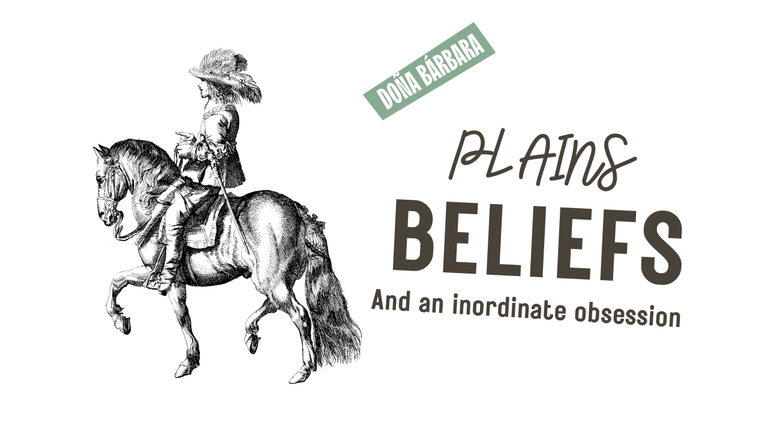Doña Barbara: a reflection of women and the Venezuelan plains [ENG-ESP]
In my studies of creative writing and literature, I came across a book that, in my adolescence, was not to my liking because of its written form: there were too many idioms. Doña Bárbara is a novel that, even though its plot is simple, resorts to the visual impacts of the accent in the Venezuelan plains; it is somewhat difficult to read because of its regionalist tone. Nevertheless, many years later, I decided to resume reading a work that has undoubtedly gained fame and admiration over the years.
The main protagonist is a vengeful woman, sentenced by a past in which an innocent soul was destroyed. She, now known as Doña Bárbara, will seek to destroy every man who stands in her way, proving that with power and money, no human justice can stand up to her.
![Spanish Version]
En mis estudios de escritura creativa y literatura, me topé con un libro que, en mi adolescencia, no fue de mi agrado por su forma escrita: había demasiados modismos. Doña Bárbara es una novela que, aun siendo su trama sencilla, recurre a los impactos visuales del acento en los llanos venezolanos; es algo difícil de leer por tener un tono regionalista. No obstante, muchos años después, decidí retomar la lectura de una obra que, sin duda alguna, ha ganado fama y admiración a lo largo de los años.La protagonista principal es una mujer dolida, destruida por un pasado en el que destruyeron un alma inocente. Ella, ahora conocida como Doña Bárbara, buscará destruir a todo hombre que se interponga en su camino, demostrando que con poder y dinero, ninguna justicia humana puede hacerle frente.

Doña Bárbara is a vile character, but charming in a certain way. Her arrogance fueled by revenge has turned her into a woman of withering precision. Her beauty attracts the most cultured men, but only one has decided to confront her: Santos Luzardo, a young man of prominent values who has returned to the plains of Venezuela to reorganize his hacienda. By bad luck, his lands are neighbors to those dominated by Doña Bárbara, who is feared even beyond the Arauca River; Santos Luzardo will have to sneak into a lawless region, where no values are valid as long as Bárbara opposes him. There is a constant struggle between decency and immorality, and there is no room for one without the other perishing.
Rómulo Gallegos is the author of this quite cultural literary work, and say cultural because of the way in which the writer captures each image within the work. From the very first paragraph, you are bombarded by images describing hostile but beautiful lands, stretching across the majesty of the Arauca River in the Venezuelan plains. Gallegos wanted to give the reader a more familiar feeling about the context in which his novel was set, and boy did he succeed! Although it can be difficult to immerse yourself in the reading, in doing so you are immersed in a coarse personification of the walking and fighting man, of cunning vileness and forbidden loves... of the tireless struggle between modernizing cultures and beliefs.
![Spanish Version]
Doña Bárbara es un personaje vil, pero encantador de cierta forma. Su prepotencia alimentada por la venganza la ha convertido en una mujer de precisiones fulminantes. Su belleza atrapa a los hombres más cultos, pero solo uno ha decidido enfrentarla: Santos Luzardo, un joven de valores prominentes que ha regresado a los llanos de Venezuela para reordenar su hacienda. Por mala suerte, sus tierras son vecinas de aquellas dominadas por Doña Bárbara, quien es temida incluso más allá del río Arauca; Santos Luzardo tendrá que escabullirse en una región sin ley, en la que no hay valores que valgan mientras Bárbara se oponga. Existe una lucha constante entre la decencia y la inmoralidad, y no hay espacio para una sin que la otra perezca.Rómulo Gallegos es el autor de esta obra literaria bastante cultural, y dogo cultural por la forma en la que el escritor plasma cada imagen dentro de la obra. Desde el primer párrafo, eres bombardeado por imágenes que describen tierras hostiles pero hermosas, que se extienden por la majestuosidad del río Arauca en los llanos venezolanos. Gallegos quiso darle al lector una sensación más familiar sobre el contexto en que se desarrollaba su novela, ¡y vaya que lo logró! Aunque puede ser difícil sumergirse en la lectura, al hacerlo te sumerges en una basta personificación del hombre andante y luchador, de la vileza astuta y los amores prohibidos... de la incansable lucha entre la modernización de culturas y creencias.

The prose in Doña Bárbara is not to be taken lightly; it is not about simple, conjugated words. The author implanted idioms typical of Venezuelan slang, more focused on the plains and its people. The Venezuelan plains are known for their solar ardor and their green expanse of land, rivers and beautiful women. There are also beliefs that invade dark hearts. In this novel, references to witchcraft and the appearance of ghosts is quite recurrent, which gives a peculiar touch to the lyrics. It is impossible not to love such a well-written and structured work; however, the use of Venezuelan slang resources forces the reader to pause to decipher certain meanings.
Perhaps this is why Doña Bárbara is a difficult novel to read, especially if you are not familiar with some of the phrases typical of the culture of the Venezuelan plains. The original work, written in Spanish, is like an abstract but hypnotic painting that compels you to stay there until the pages end. It is an adventure for readers who love the challenges of language and the beauty of an inhospitable story, which not only tells of a woman's cunning, but also reveals that even the cruelest hearts can change in the name of love.
![Spanish Version]
La prosa en Doña Bárbara no se debe tomar a la ligera; no se trata de palabras simples y conjugadas. El autor implantó modismos típicos de la jerga venezolana, más centrada en los llanos y su gente. Los llanos venezolanos son conocidos por su ardor solar y su verde extensión de tierras, ríos y mujeres hermosas. También existen creencias que invaden los corazones tenebrosos. En esta novela, las referencias a la hechicería y la aparición de espantos es bastante recurrente, lo que da un toque peculiar a las letras. Es imposible no amar una obra tan bien escrita y estructurada; sin embargo, el uso de recursos propios de la jerga venezolana obliga al lector a realizar pausas para descifrar ciertos significados.Quizás sea por esto que Doña Bárbara sea una novela difícil de leer, sobre todo si no se está familiarizado con algunas frases propias de la cultura de los llanos venezolanos. La obra original, escrita en español, es como una pintura abstracta pero hipnótica, que te obliga a seguir allí hasta que las páginas terminen. Es una aventura para lectores amantes de los desafíos del lenguaje y la belleza de una historia inhóspita, que no solo relata la astucia de una mujer, sino que además devela que, incluso los corazones más crueles, pueden cambiar en nombre del amor.

Santos Luzardo, protagonist in a land of evils and dangers, will have to cross the heart of llano to recover it from that woman who, under fear and terror, has corrupted him. The only thing he has to do is simple: not to fall in love with her, the one they call “devourer of men”. Mrs. Barbara, confident and supported by the darkness of black magic, will do whatever is necessary to destroy his soul, just as she has destroyed the souls of so many illusioned men... Who will win the battle?
Romulo Gallegos uses doubt as the main tool for his work; those who are corrupted by evil lose everything and loneliness covers them, but those who are strong-souled and moral, will have everything, they are even capable of healing those who are lost. That is the message I take away from this wonderful novel.
![Spanish Version]
Santos Luzardo, protagonista en una tierra de males y peligros, tendrá que atravesar el corazón de llano para recuperarlo de aquella mujer que, bajo el miedo y el terror, lo ha corrompido. Lo único que debe hacer es simple: no enamorarse de ella, la misma a la que llaman "devoradora de hombres". Doña Bárbara, confiada y apoyada por la oscuridad de la magia negra, hará lo necesario para destruir su alma, así como destruyó el alma de tantos hombres ilusionados... ¿Quién ganará la batalla?Rómulo Gallegos emplea la duda como principal herramienta para su obra; quienes se corrompen por el mal pierden todo y la soledad los cubre, pero quienes son de alma fuerte y moral, lo tendrán todo, incluso, son capaces de sanar a quienes están perdidos. Ese es el mensaje que me llevo de esta novela maravillosa.
See you in the next book review!
Es un libro icónico. Lleno de elementos que forman parte de lo que fue y es cultura venezolana. El libro es muy rico por la diversidad de modismos. Es algo bueno para leer; aunque no soy muy fan.
Las novelas regionalistas suelen ser muy culturales, por lo que es habitual ver ver muchos modismos. Esta es buena pero un poco difícil de leer si no se conocen ciertas palabras.
¡Gracias por comentar!
No sé, no me gusta 😔. La novela es feisima, la de la televisión, es horrible y sí, entiendo la historia, pero del desarrollo no.
Quizás el libro no tenga el mismo desenlace y como dices también, quizás esa novela literaria no es para todos.
Jajaja la telenovela es muy cruda pero es un poco diferente, la novela es más cruda 😬, y es difícil de leer por tantos modismos. Sin embargo, es una belleza de lectura, cuando logras sincronizarte con la historia.
Te mando un gran abrazo mi estimada 😊.
La telenovela es un asco
Congratulations @soldierofdreams! You have completed the following achievement on the Hive blockchain And have been rewarded with New badge(s)
Your next target is to reach 150000 upvotes.
You can view your badges on your board and compare yourself to others in the Ranking
If you no longer want to receive notifications, reply to this comment with the word
STOPIt is fascinating how you have been able to appreciate the complexity of Rómulo Gallegos' work over time. Without a doubt, it is a classic that continues to resonate in Latin American literature. Thanks for sharing your impressions!
Undoubtedly this is one of the novels written that most strengthens the Latin American drama. Thank you very much for commenting!